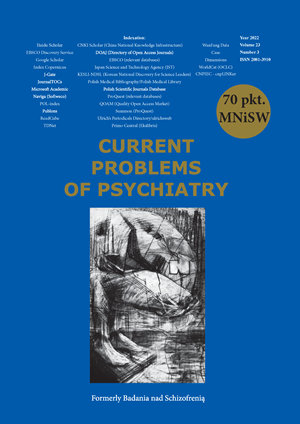Wiedza i postawy wobec uzależnienia od substancji psychoaktywnych w grupach zawodowych pracowników służby zdrowia, nauczycieli i policji w województwie lubuskim
DOI:
https://doi.org/10.2478/cpp-2022-0014Słowa kluczowe:
personel medyczny, policjanci, nauczyciele, wiedza, postawy, uzależnienie od środków psychoaktywnychAbstrakt
Uzależnienie od substancji psychoaktywnych jest zjawiskiem powszechnym, narastającym wraz z postępem procesu integracji europejskiej. Profesjonalną pomoc osobom uzależnionym i będącym pod wpływem substancji psychoaktywnych powinny nieść przede wszystkim instytucje ochrony zdrowia. Ważnym i ciekawym zagadnieniem wydaje się ocena jak osoby, które mają najczęstszy kontakt z uzależnionymi są przygotowane do udzielania pomocy, jaka jest ich wiedza i nastawienie do osób uzależnionych od substancji psychoaktywnych. Materiał do badań stanowił kwestionariusz ankiety dla osób mających kontakt i / lub zajmujących się zawodowo osobami uzależnionymi od substancji psychoaktywnych. Zbadano 253 osoby mające kontakt zawodowy z osobami uzależnionymi od substancji psychoaktywnych, w tym 102 mężczyzn i 151 kobiet. Wiedzę w zakresie substancji psychoaktywnych najczęściej respondenci zdobywali za pośrednictwem środków masowego przekazu. Wyjątek stanowi grupa zawodowa lekarzy, która jako jedyna sięgała do fachowego piśmiennictwa. Kontaktu z osobami uzależnionymi od substancji psychoaktywnych nie obawiało się 68,6% lekarzy, 68,4% policjantów, 45,9% pielęgniarek i tylko 39,0% nauczycieli. Lęk mogą wzbudzać głównie ewentualne zachowania agresywne, których obawia się 49,8% respondentów, w tym 58,3% kobiet i 37,2% mężczyzn. 90,1% respondentów za przyczynę agresji uważa brak panowania nad swoimi emocjami. Wyniki pracy mogą być pomocne w kreowaniu nowych, satysfakcjonujących rozwiązań trudnych sytuacji i rozwijania współpracy nacechowanej empatią i akceptacją.
Bibliografia
1. Sierosławski J.: Diagnoza potrzeb w zakresie pomocy narkomanom w Poznaniu. Alkoholizm i Narkomania 1999; 35(2): 209-223.
2. Wojciszke, B.: The consequences of being an influential minority on social controversies n the Polish emerging democracy. [W]: W. Wosinska, R. B. Cialdini, J. Reykowski, D. W. Barrett.: The practice of social influence in multiple cultures. Mahwah, NJ: Lawrence Erlbaum 2001; 173-188.
3. Beck A.T., Wright F.D., Newman C.F., Liese B.S.: Terapia poznawcza uzależnień. Wydawnictwo Uniwersytetu Jagiellońskiego, Kraków 2007.
4. Andrejew-Frączek D.: Narkomania w Polsce. Raport nr 19, Kancelaria Sejmu 1992.
5. Godwod-Sikorska C., Sierosławski J.: Attitudes towards drug abusers. Allcoholism and other dependencies. World Psychiatric Association Regional Symposium Proceedings, Warsaw, Poland 22-25 November 1987. Regionalne Sympozjum Światowego Towarzystwa Psychiatrów Warszawa 22-25 listopada 1987.
6. Lipowska-Teutsch A., Wiernikowski A., Wołek E.: Postawy pracowników służby zdrowia wobec narkomanii i narkomanów. [W]: Chruściel T.L., Hołyst B., Tyfczyńska J.: Zeszyty problemowe narkomanii: Profilaktyka Narkomanii. Warszawa 1986; 1: 273-283.
7. Demetrovics Z., Barth A., Bognar G., Kun B., Brink W.: Wiedza i postawy psychiatrów wobec osób uzależnionych od substancji psychoaktywnych oraz sposoby ich leczenia na Węgrzech. Alkoholizm i Narkomania 2007; 20(3): 303-312.
8. Jacka D., Clode D., Patersson S., Wyman K.: Attitudes and practices of general practitioners training to work with drug using patients. Drug and Alcohol Review 1999; 18(3): 287-291.
9. Latelski M., Kulik T.B., Kobyłecka E., Stefanowicz A., Pacian A.: Staż pracy lekarzy podstawowej opieki zdrowotnej a wiedza na temat narkomanii. Zdrowie Publiczne 2003; 113(3/4): 312-315.
10. Macander D.: Nauczyciel -realizator profilaktyki szkolnej. Serwis Informacyjny Narkomania 2008; 40(1): 38-42.
11. Tamilla J., Kasprzak M., Olszewski W., Gruszczyński W.: Postawy młodzieży, jej rodziców oraz nauczycieli szkół średnich wobec problematyki toksykomanii w świetle badań własnych. Przyczyny i skutki złej adaptacji społecznej dzieci i młodzieży. IX Sympozjum Psychiatrów Dzieci i Młodzieży. Łódź 1987.
12. Latelski M., Kulik T.B., Kobyłecka E., Stefanowicz A., Pacian A.: Staż pracy lekarzy podstawowej opieki zdrowotnej a wiedza na temat narkomanii. Zdrowie Publiczne 2003; 113(3/4): 312-315.
13. Malczewski A.: Problem narkotyków i narkomanii w Polsce -analiza zróżnicowania terytorialnego. Serwis Informacyjny Narkomania 2010; 50(2): 32-40.
14. Janiszewska L.: Uprzedzenia wobec chorych na AIDS ze szczególnym uwzględnieniem postaw pracowników medycznych. Psychologia, Zeszyty naukowe WSHE w Łodzi 2003; 31(1), 45-58.
15. Ordakowski M., Karwat B.: Stosunek personelu pielęgniarskiego nie pracującego w klinikach zakaźnych do osób żyjących z HIV i chorych na AIDS. Stowarzyszenie Na Rzecz Rozwoju Społecznego „Stricte”, Szczecin 2000.
16. Marcinkowski J., Jabłoński P.: Zarys historii terapii uzależnień w Polsce a współczesny system pomocy osobom uzależnionym. Serwis Informacyjny Narkomania 2008; 44(5): 18-25.
Pobrania
Opublikowane
Numer
Dział
Licencja
Prawa autorskie (c) 2022 Autorzy

Utwór dostępny jest na licencji Creative Commons Uznanie autorstwa 4.0 Międzynarodowe.


